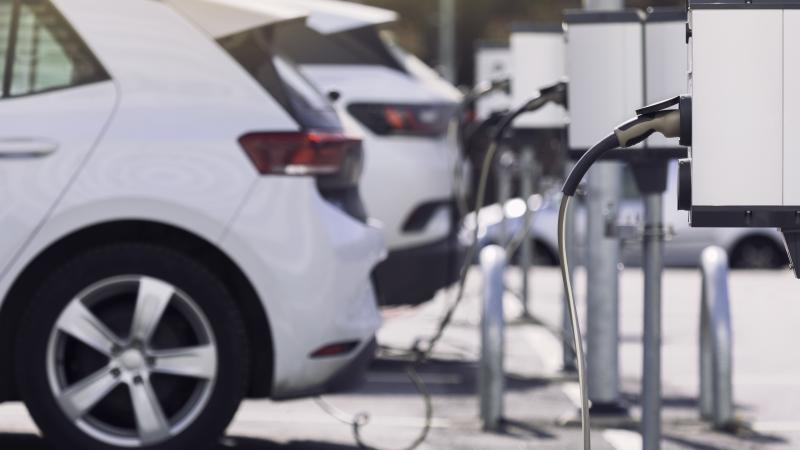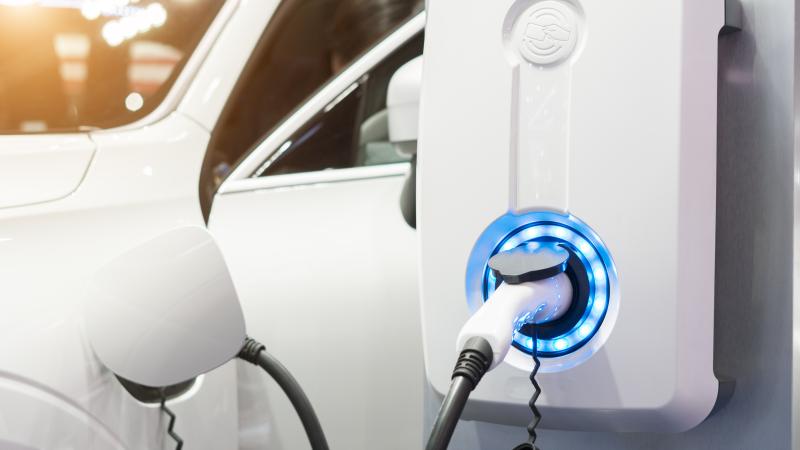Electric Vehicles in Alexandria
Electric Vehicles in Alexandria
It is now easier, more affordable, and more practical for homeowners, businesses, and local governments to use electric vehicles (EVs) for their daily commute and operations. Although walking, biking, or taking public transportation remain the most sustainable modes of transportation - electric vehicles outperform traditional internal-combustion engine (ICE) vehicles both environmentally and economically, when you need to drive. Increasing EV adoption in our community is a key program to advance smart mobility and meet the greenhouse gas reduction goals in the City of Alexandria’s Energy and Climate Change Action Plan.
"Ask an EV Charger installer anything" webinar - April 17, 2025
Have questions about installing EV chargers at your home, multi-family community, business, or workplace? Check out this recording of our "Ask an EV Charger Installer Anything" webinar from Earth Month 2025 for an overview of the EV charger installation process, and a Q&A with attendees.
Still have questions? Complete this form to connect with us.
Highlights
Learn More About...
About Electric Vehicles
WHY Drive Electric?
Electric vehicles are cleaner, quieter, and more efficient than gas alternatives and have no harmful tailpipe emissions. EV drivers may experience:
- $6,000 – $10,000 average savings over vehicle lifetime, when switching to an EV. EV fuel and maintenance cost savings can offset higher purchase prices.[1]
- 66% emissions reductions – The lifecycle carbon dioxide emissions reductions savings potential of EVs operating on the Virginia Dominion Energy grid.[2]
- $4,600 saved in maintenance and repair costs, lifetime average savings per EV, as EVs have fewer moving parts, do not require oil changes, utilize regenerative braking, and more.[3]
Dominion Energy provides a wealth of information about electric vehicles for Virginia customers. Check out the many resources they have to offer:
Virginia Clean Cities, a local non-profit partnering with James Madison University, offers more information about electric vehicles and other alternative fuel vehicles on their website.
Electric Vehicle and Charger Incentives
The U.S. Department of Energy’s Energy Efficiency & Renewable Energy office manages the Alternative Fuels Data Center, which houses a wealth of information about laws and incentives governing alternative fuel vehicles. Review Federal laws and incentives, and Virginia-specific information to see what incentives are available.
ELECTRIC VEHICLE INCENTIVES
- The Clean Vehicle Tax Credit offers taxpayers who purchase an eligible vehicle for a tax credit of up to $7,500 for a qualified new vehicle and up to $4,000 for a qualified pre-owned vehicle.
- NOTE: Vehicles put into service after April 18, 2023 must meet requirements for critical minerals sourcing and/or battery component sourcing to qualify for a tax credit. Visit the Internal Revenue Service’s (IRS) Clean Vehicle Tax Credit website for full eligibility information, or review the IRS New Clean Vehicle Tax Credit Checklist and the Used Clean Vehicle Tax Credit Checklist for more information.
ELECTRIC VEHICLE CHARGER INCENTIVES
- The Alternative Fuel Vehicle Refueling Property Credit offers a tax credit for the purchase of EV charging equipment for your principal residence. The credit is generally 30% of the item’s cost, up to $1,000. You must be located in an eligible census tract to be eligible for the credit. Visit the IRS’s Alternative Fuel Vehicle Refueling Property Credit website for full eligibility information. See if you’re located in an eligible census tract using the Department of Energy’s 30C Tax Credit Eligibility Locator.
- Dominion Energy Resources: Dominion Energy offers incentive programs and rebates for installing EV chargers at homes, multi-family communities, businesses, and fleets. Learn more at their Electric Vehicles page.
- Charging at home? Dominion Energy’s EV Charger Rewards program offers incentives for residential customers allowing Dominion Energy to leverage qualified Level 2 chargers to make adjustments to charging behavior during periods of high electric demand. Through the Residential Charger Program, Dominion will install and maintain a Level 2 charging station at your home for about $40 per month.
- Charging on the go? Dominion Energy’s Level 2 Charging Program provides a turn-key solution for level 2 EV charging infrastructure at your business, parking area, or multi-family community. The program provides incentives for the EV charging station make-ready and convenient, monthly on-bill payments for the remaining costs.
Charging at your multi-family dwelling or workplace
Plug in Alexandria
Plug in Alexandria helps multi-family communities in the City of Alexandria install electric vehicle (EV) chargers by providing expert guidance and financial assistance. Whether you’re a condo association, homeowner’s association, or apartment complex, this program may make it easier and more affordable to add EV charging stations for residents and guests.
Multi-family communities are welcome to apply for the Plug In Alexandria program.
Applications are accepted on a rolling basis, however available funding has been fully awarded for this program, as of September 2025. If future funding is made available for this program, the City will evaluate applications approximately every 8 weeks.
Stay Connected with Multi-Family Programs
Looking for resources or technical assistance for charging at your multi-family dwelling, or workplace? Send us a note by completing this form to be connected with City staff and ongoing initiatives.
Curbside Charging
Curbside EV charging is now allowed in Alexandria!
City Council approved a Curbside EV Charging Program at the February 21, 2026 public hearing, that will bring publicly accessible EV chargers to our neighborhood streets at no cost to the City.
Curbside charging will make it easier for residents without a dedicated driveway or garage or that live in a multi-family community to charge close to home.
Qualified vendors will be allowed to install publicly accessible curbside chargers throughout the City, Vendors are responsible for installation, maintenance, and customer service. Curbside chargers will have a minimalistic design and must meet siting and operational standards outlined in the program requirements.
Up to 60 chargers may be installed during the first two years. After that initial period, the City will pause new approvals to evaluate performance data and gather community feedback before determining next steps.
City EV Initiatives
ELECTRIC VEHICLE CHARGING INFRASTRUCTURE READINESS STRATEGY
The Electric Vehicle Charging Infrastructure Readiness Strategy (EVRS) is a roadmap to anticipate the electric vehicle charging infrastructure needs of City residents, workforce members, and visitors as electric vehicles become more mainstream. The EVRS is built around a set of 31 recommendations —including potential near- and long-term actions—that support the Alexandria community’s electric vehicle charging infrastructure needs.
City staff are currently implementing the EVRS recommendations to improve EV charging opportunities, streamline City processes, and develop a sustainable electric vehicle ecosystem.
ELECTRIC VEHICLE PURCHASING
- Alexandria Transit Company (DASH) is committed to achieving a zero-emission fleet by 2037 and has more than a dozen 100% battery-electric buses (BEBs) in its fleet, the largest zero-emission bus fleet in Virginia.
- Alexandria City Public Schools (ACPS) currently has five BEBs in its fleet and was recently awarded $2.3M in State funding to procure additional electric buses, planned for 2023.
- On January 26, 2021, Alexandria City Council formally approved the City’s first Alternative Fuel Policy. This policy, which will govern the purchase of City owned and maintained vehicles, includes the goals to reduce overall vehicle emissions from the City’s fleet. The City owns and maintains a fleet of approximately 900 vehicles and pieces of equipment. The City is introducing electric vehicles into the municipal fleet across departments. A fleet transition planning effort is underway to zero-emission goals for the fleet, and to develop a roadmap for the most effective way to transition the fleet.
QUESTIONS? LET US KNOW!
- Please send us your questions by completing this form.
- Learn more about Eco-City Alexandria



